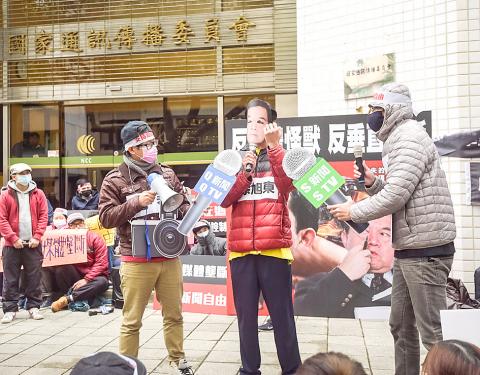Far EasTone Telecommunications Co Ltd (遠傳電信) yesterday said it is withdrawing a NT$74.5 billion (US$2.39 billion) buyout bid for local cable TV operator China Network Systems Co Ltd (CNS, 中嘉網路), along with its partner Morgan Stanley Private Equity Asia IV’s (MSPE), due to a lengthy regulatory review.
The telecoms’ comments came after CNS’ major shareholder, MBK Partners LP, and MHPEA Chrome Holding BV, a subsidiary of Morgan Stanley, agreed to initiate a revocation of the acquisition deal. The investment project was touted as one of the largest cable TV acquisition deals in recent years in the nation.
“To prevent the review of the deal from affecting the company’s operational development and plans, the company, MBK and MSPE have agreed to initiate the revocation [of the bid],” CNS said in a statement yesterday.

Photo: Huang Yao-cheng, Taipei Times
The National Communications Commission (NCC) has requested a second review of the case, despite giving a conditional go-ahead to the acquisition in January last year.
The Fair Trade Commission also approved the deal in 2015.
Facing mounting criticism, the Investment Commission returned the case to the NCC for further review to clarify if the deal violates regulations barring investment in media outlets by the government, political parties and the military.
The developments “are different from what we originally expected,” Far EasTone said in a separate joint statement with MSPE.
Speculation swirled that MSPE was withdrawing its application because of the slim chance that it would receive regulatory approval.
In July 2015, MSPE offered to buy a significant stake in CNS from MBK through a holding company called North Haven Private Equity Asia IV LP (NPHEA).
Far EasTone would indirectly own a stake of CNS, as it spent about NT$17.12 billion in cash subscribing to corporate bonds issued by NPHEA’s local subsidiary.
The deal would have allowed Far EasTone to complete the last piece of its digital convergence drive, as the partnership with MSPE would have helped it tap into the nation’s cable TV and fledgling smart home markets.
CNS has a 25.7 percent share of the local cable TV market, with 1.29 million subscribers.
Far EasTone said it does not plan to invest in cable TV companies as long as the government does not relax restrictions on the government, political parties and military holding stakes in media outlets.
The telecoms is restricted from buying a stake in CNS because government funds hold an unspecified share of Far EasTone.
“The law is obsolete,” Far EasTone said.
The company said it plans to allocate the NT$17.12 billion to foster digital convergence and deepen its cooperation with content providers and over-the-top operators.
The company added that its collaboration with CNS would not be affected by the cancelation of the acquisition deal.
NCC spokesman Wong Po-tsung (翁柏宗) said the commission has yet to receive requests from CNS or MSPEA to withdraw their applications.

NATIONAL SECURITY THREAT: An official said that Guan Guan’s comments had gone beyond the threshold of free speech, as she advocated for the destruction of the ROC China-born media influencer Guan Guan’s (關關) residency permit has been revoked for repeatedly posting pro-China content that threatens national security, the National Immigration Agency said yesterday. Guan Guan has said many controversial things in her videos posted to Douyin (抖音), including “the red flag will soon be painted all over Taiwan” and “Taiwan is an inseparable part of China,” while expressing hope for expedited “reunification.” The agency received multiple reports alleging that Guan Guan had advocated for armed reunification last year. After investigating, the agency last month issued a notice requiring her to appear and account for her actions. Guan Guan appeared as required,

A strong cold air mass is expected to arrive tonight, bringing a change in weather and a drop in temperature, the Central Weather Administration (CWA) said. The coldest time would be early on Thursday morning, with temperatures in some areas dipping as low as 8°C, it said. Daytime highs yesterday were 22°C to 24°C in northern and eastern Taiwan, and about 25°C to 28°C in the central and southern regions, it said. However, nighttime lows would dip to about 15°C to 16°C in central and northern Taiwan as well as the northeast, and 17°C to 19°C elsewhere, it said. Tropical Storm Nokaen, currently

PAPERS, PLEASE: The gang exploited the high value of the passports, selling them at inflated prices to Chinese buyers, who would treat them as ‘invisibility cloaks’ The Yilan District Court has handed four members of a syndicate prison terms ranging from one year and two months to two years and two months for their involvement in a scheme to purchase Taiwanese passports and resell them abroad at a massive markup. A Chinese human smuggling syndicate purchased Taiwanese passports through local criminal networks, exploiting the passports’ visa-free travel privileges to turn a profit of more than 20 times the original price, the court said. Such criminal organizations enable people to impersonate Taiwanese when entering and exiting Taiwan and other countries, undermining social order and the credibility of the nation’s

‘SALAMI-SLICING’: Beijing’s ‘gray zone’ tactics around the Pratas Islands have been slowly intensifying, with the PLA testing Taiwan’s responses and limits, an expert said The Ministry of National Defense yesterday condemned an intrusion by a Chinese drone into the airspace of the Pratas Islands (Dongsha Islands, 東沙群島) as a serious disruption of regional peace. The ministry said it detected the Chinese surveillance and reconnaissance drone entering the southwestern parts of Taiwan’s air defense identification zone early yesterday, and it approached the Pratas Islands at 5:41am. The ministry said it immediately notified the garrison stationed in the area to enhance aerial surveillance and alert levels, and the drone was detected in the islands’ territorial airspace at 5:44am, maintaining an altitude outside the effective range of air-defense weaponry. Following